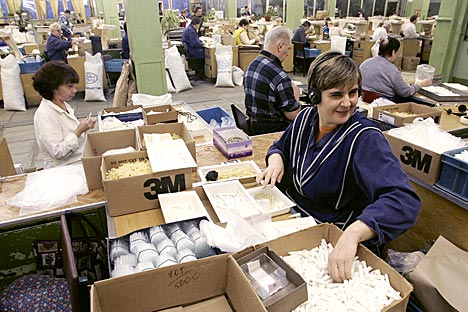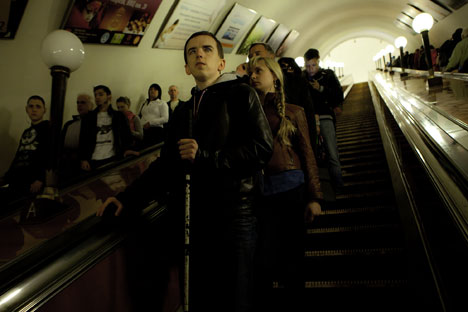
The Soviet conventional wisdom was simple: It was better for the blind and partially sighted to live in their own communities specially suited to their needs. Source: Itar-Tass
The village of Rusinovo, about 70 miles from Moscow, was once a model community adapted to the needs of the blind and visually impaired. Today Rusinovo is a ghost town, all but abandoned. The only people who still live here are elderly or simply have nowhere else to go.
One resident is Sergey Mulloev, 55, a grey-haired man who wears glasses with thick lenses. He has only 2 percent of his vision but he says that's enough to commute to Moscow by train.
“I had to find a job in Moscow, there was simply no other way,” Sergey said. “I have four kids to support." He works at a factory that makes play dough, colored markers and pens and earns the equivalent of 500 dollars a month. The money is a pittance compared to the average Moscow wage of 57,000 rubles – but it is at least three times more than he can hope to make in his hometown of Rusinovo.
In the 1980s, the primary Rusinovo employer was a company that made electronic components for TV sets, assemblies for combine harvesters, and sofas. Now its range of products is limited to jar caps and pipettes.
During the Soviet era, the company had 600 employees who were blind. In 2013 there are only 54 visually impaired employees on its payroll. They each earn between $100 and $175 a month. There are dozens of these model communities for the blind, and they have all gone the same way.
The Russian Society of the Blind headquartered in Moscow registered 212 thousand people like Sergey Mulloev in Russia. In fact, they are about a million, according to Russian Society of the ophthalmologists and NGOs.
Most are entirely able to work and lead active lives despite their disability. But they are essentially left on the sidelines, advocates say, by the Russian society, which has few if any accommodations for people with disabilities.
Isolation and institutionalization
The Soviet conventional wisdom was simple: It was better for the blind and partially sighted to live in their own communities specially suited to their needs. There were settlements for the blind, where they were provided residence, employment, schools and rehabilitation centers.
After the Soviet Union collapsed, that system came crashing down – and there is no one left to help the disabled come back from these reservations and rejoin the wider community.
“The first step is the most difficult"
Muscovite Pavel Obiukh, 34, is completely blind. Yet every morning he takes the metro to work; he navigates by hearing and tapping his white cane. The sight of a blind man with a cane or a guide dog is still rare enough in the Russian capital and metro escalators to draw stares.

Pavel Obiukh. Source: Vivian del Rio
Obiukh used to work at a company run by the Russian Society of the Blind. Recently, however, he steered his life rather sharply in a new direction. “I wanted to have some friends who are sighted. I wanted to go to places everyone else goes,” he said.
And that is when he had to make a choice: "Either you hole up in your own home, or you force yourself to take the first step outside." He admits that he was very shy and self-conscious at first. “I wish I could invent some way to remove that barrier, to make sure that blind people do not feel inferior because of their disability."
Obiukh’s gestures are confident and assertive; his back is straight. What's more, he earns decent money. "I make enough to provide for myself. I am not a native Muscovite, but I make enough to rent an apartment in the city, and I don't even have to go hungry after paying the landlord."
He has also turned his disability into his strength. A teacher, lawyer and manager by education, Pavel Obiukh works for “Dialogue in the Dark,” an international company that offers business-training courses in 30 countries.
Founded 25 years ago, the company entered the Russian market in 2011. Obiukh is the leader of the Russian team of blind coaches who help normal-sighted people develop their communication skills. His customers include the steel maker Severstal, Coca-Cola, and several oil companies.
He is a teacher of the sighted, yet he conducts his classes in pitch-black darkness. It turns out that when people can’t see anything, they are better able to focus on what others are saying, on their intonations, and ultimately, some say, on problem solving.
Obiukh was not born blind; he lost his sight slowly to glaucoma over the course of several years. He graduated from Boarding School No. 1 for the Blind and Partially Sighted in Moscow. The school was a very isolated community.
“I am glad that I was studying at a regular university,” he said. He went completely blind during the fourth year of his studies, but that did not prevent him from graduating with distinction. He was soon awarded a PhD after defending his thesis, "Preparing graduates of boarding schools for disabled children to independent life."
The lesson of parachuting
Obiukh is an extreme sportsman and active outdoorsman who skis and enjoys parachute jumps. He also reads a lot, but for him, Braille is a thing of the past: His iPhone has a voice menu. So does his Facebook app. He regularly keeps in touch with his 300 Facebook friends.
He compares making the first step outside the cloistered communities of the blind to a parachute jump. “You know, the hardest part is when you fall out of the plane. You realize that there is 4 kilometers of empty space beneath, and the plane is already gone! So the hardest part is taking that first step out of the plane. Once you've done that, euphoria kicks in."
All rights reserved by Rossiyskaya Gazeta.
Subscribe
to our newsletter!
Get the week's best stories straight to your inbox